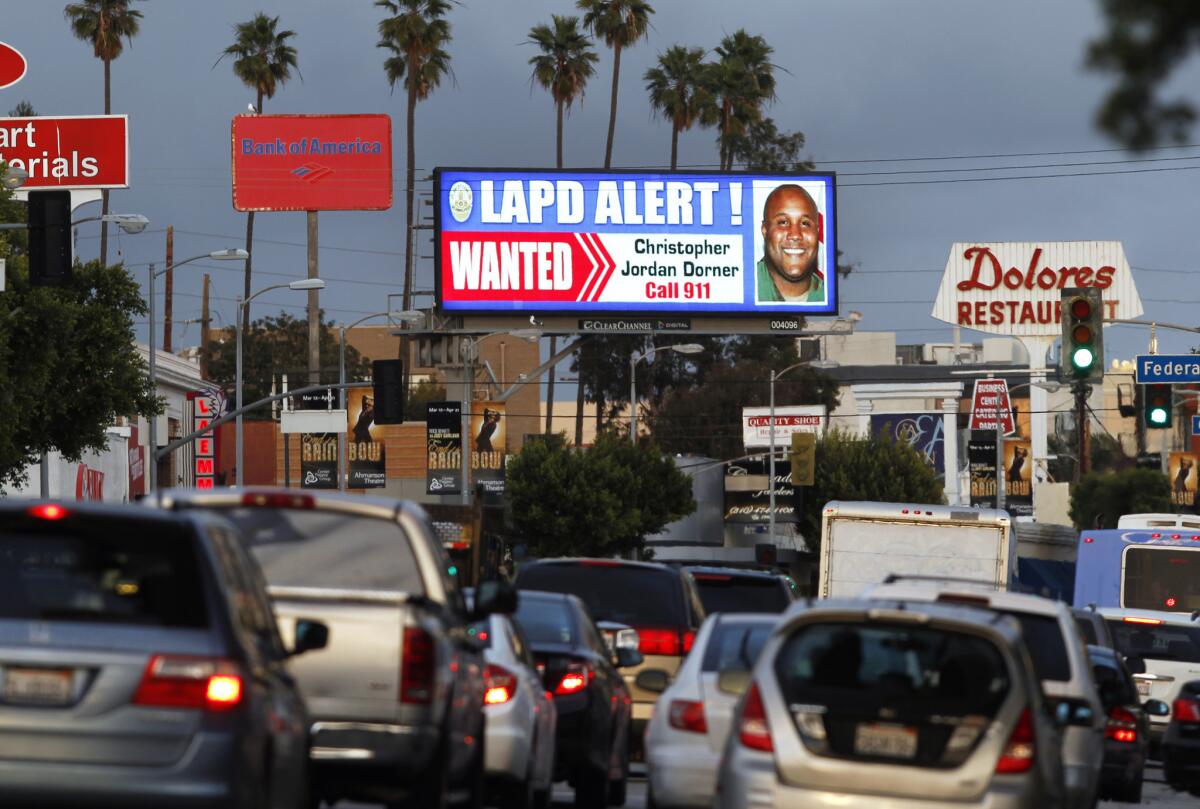Dorner’s LAPD is on the way out

- Share via
There won’t be a happy ending to Christopher Dorner’s quest for vengeance against the Los Angeles Police Department. Nothing justifies his murder of innocents or his threats against LAPD personnel and their families. The only positive thing that can possibly be said at the moment is that today’s LAPD is in the hands of new leaders who are slowly but surely ending the old subculture that Dorner describes in his online manifesto.
I am talking about the department’s former tradition of systematically mistreating black officers. For more than 20 years I have represented dozens of black LAPD officers, interviewed hundreds of officers of all races, and know the history of the old LAPD’s — the Blue Grip’s — deep-seated hostility to black officers. Up until the 1968 riots, LAPD officers called the white head of South Bureau “The Nigger Inspector.” And it was the early 1960s before Chief William Parker ended the mandatory segregation of squad cars in which black and white officers were forbidden to ride together to ensure that no white officer would have to follow the orders of a black man.
I remember like it was yesterday when Deputy Chief Jesse Brewer, the wise and classy African American who became the first black president of the Los Angeles Police Commission, came to my law office in 1990. He described to me his own ordeals on the force, in which white officers illegally blocked his entrance to the Police Academy, tried to plant false evidence on him, blocked all of his promotions and set him up for ambush in the field. He also described how viciously the department retaliated against him and other officers who tried to stand up for fellow officers or civilians who suffered abuse from cops. The LAPD never did allow whistle-blowers of any kind to survive, no matter how righteous they were.
FULL COVERAGE: The manhunt for Christopher Dorner
Brewer explained that black officers just had to take the abuse and outsmart the white officers trying to deep-six them. “If you let them get to you, you’ll become homicidal,” he said.
I have no idea whether, as Dorner alleges, the LAPD falsely accused Dorner and retaliated against him for reporting the abuse of a civilian. But I know many black officers who received nothing but vicious retaliation for trying to report the same kind of abuse. And I know what my clients, Myrna Lewis, Terry Tipton and others suffered for reporting their racially abusive mistreatment and the sabotage they endured for demanding the end of the LAPD’s hostile mistreatment of minority women. I don’t know whether Dorner was wrongfully terminated, but I do know that my clients were unfairly forced out of the LAPD because they chose to fight the racism and sexism of the Blue Grip. It is important to acknowledge this history if we are to understand and overcome the disturbing support for Dorner’s manifesto from the black community on the Internet and on black radio, and if we are to ever free ourselves from the toxic wake of the LAPD’s past.
Dorner is absolutely wrong when he states in the manifesto that “the department has not changed since the Rampart and Rodney King days.” It’s not surprising that someone who feels he has unjustly lost everything would want to lash out, but in this case he is demonstrably wrong. The LAPD has definitely changed at the top and is currently in the process of changing its old guard culture. We’re not done; there are decades still of work to be done to change the institutional culture, but since Judge Gary Feess took the reins of the LAPD with the consent decree, since William Bratton and Charlie Beck, respectively, were appointed chief, and since John Mack, Andrea Ordin and Rick Drooyan have headed the police commission, the LAPD has completely changed direction at the top, from the brutal, shock and awe, we-are-above-the-law Blue Grip cowboys of the Darryl Gates era to the constitutional policing, public-trust-seeking era of Bill Bratton and Charlie Beck. The good guys are now in charge of LAPD culture; it is a huge change and the right beginning to real police reform.
TIMELINE: Manhunt underway for ex-LAPD officer suspected of multiple shootings
Anyone who can’t see the difference between a chief who callously defended the brutal beating of Rodney King and a chief who leads a majority of color police force that seeks the trust of the poor black and poor Latino communities has lost his way.
Connie Rice is a civil rights attorney in Los Angeles.
More to Read
A cure for the common opinion
Get thought-provoking perspectives with our weekly newsletter.
You may occasionally receive promotional content from the Los Angeles Times.









